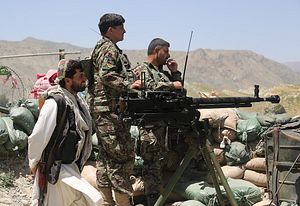Make no mistake about it, Afghan First Vice President Abdul Rashid Dostum’s military adventurism in northern Afghanistan is not to assist Kabul in its war against the Taliban, but to cement his own foothold in his home turf. Dostum sees the writing on the wall for the future of the fledgling central government, brokered by Secretary of State John Kerry in 2014. Kabul is limping on from a bloody 2016 fighting season, and to General Dostum its future looks bleak.
After assisting in a military operation in Jawzjan, the strongman’s home district, Dostum criticized the Afghanistan’s National Unity government, saying, “Mr. Abdullah [Abdullah] is [ethnically] a Tajik, but he is incapable and does not have a good name among the people. If you speak Pashto with President [Ashraf Ghani], you will be a good person, and if you speak Pashto and you are from Logar [province], then you are very good,” he said.
The comments come as Afghanistan struggles to fight a resurgent Taliban with major provincial capitals such as Farah, Kunduz, and Lashkar Gah under siege. Coalition forces under the Resolute Support mission continue to maintain that Afghan forces are capable of controlling major population centers, despite the brief collapse of Kunduz a second time this fall.
As the Taliban and other insurgent forces make gains across rural sectors of Afghanistan, Dostum is doing what he does best, hedging his bets to pick a better winner when the time comes. During Afghanistan’s civil war period Dostum was known for his treachery, constantly switching sides, the hallmark of an opportunist looking to cement gains in the zero sum game that is Afghanistan’s conflict.
Dostum has spent much of the past two decades dominating parts of northern Afghanistan with his private Uzbek militia. During the early 90’s he commanded tens of thousands of militiamen, printed his own cash, and owned an airline.
In 2001, Dostum jumped on the U.S. bandwagon, assisting U.S. forces to overthrow the Taliban. However, the mutual friendship would soon come to an end as the U.S. withdrew aid over Dostum’s continued civil war with his rival, the powerful governor of Balkh province, Atta Mohammed Noor.
“I tried to talk Dostum and Attah into becoming rich people, but they’d rather kill each other over cows” then-U.S. Ambassador Robert Finn said.
Today, Dostum continues to cement his grip on northern Afghanistan by abusing his authority as vice president and utilizing Afghan forces for private gain. Having just completed an operation to clear Ghormach district, which fell to Taliban militants a couple weeks ago, Dostum seeks not to plant Kabul’s flag in Faryab province, but to remind its inhabitants of who truly rules the region.
“Everyone in those areas bows to Dostum and he is the one to hire and fire government employees,” said Asadullah Jamali, a prominent tribal elder in Faryab province.
Before joining Ashraf Ghani’s ticket as vice president, many Afghan officials worried Dostum would use his position to bolster the ranks of his own private militia and eventually turn his guns on the central government.
“They want to portray me as the leader of a coup. Those who say so are my enemies,” Dostum said in a telephone interview with the Washington Post. “They say I will bring my men, en masse, and pose a danger to the future. If I were a danger, I would have done something in the past 13 years.”
Those fears are slowly coming true as Dostum’s Junbish militia has overtaken many of the traditional roles of Afghan security forces in Faryab and have antagonized the local population, “Local commanders loyal to Junbish and Jamiat have been involved in a number of killings, extortion from the public, land grabbing, armed robbery, harassment collection of ushur (illegal levies) and other activities for the advantage of their respective political parties,” investigators on a trip to northern Afghanistan noted.
Throughout the 2016 fighting season, Dostum has launched numerous operations into his hometown of Jawzjan, Ghromach district, and recently micromanaged the war in Kunduz. He has constantly criticized the effectiveness of the NUG, attempting to sow discontent among Afghans and government officials, and has undermined Ghani’s authority to handle security threats in the country. Dostum seeks not to stabilize Kabul, but to bolster his position in northern Afghanistan when it collapses.

































